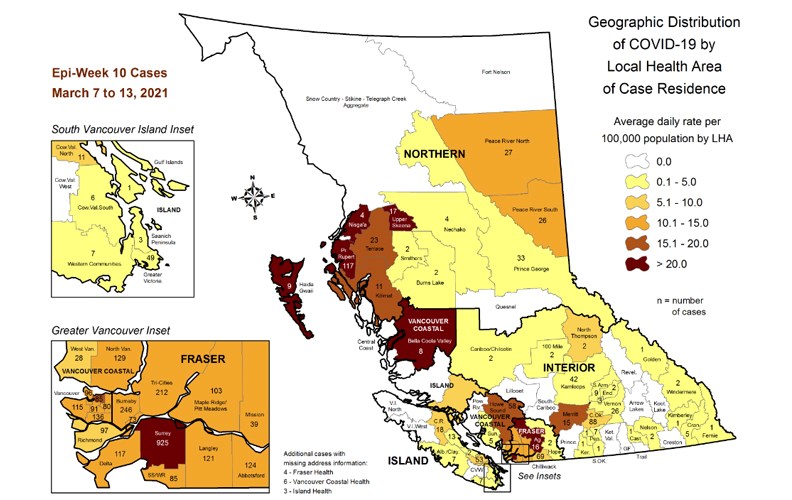More than 300,000 front-line workers in B.C. - including grocery workers, teachers, first responders and others – will be eligible to receive a COVID-19 vaccine starting in April.
Premier John Horgan announced on Thursday that the province is expecting to received roughly 340,000 doses of the AstraZeneca vaccine by the end of May, and will use those doses to immunize essential workers. In addition, the province is looking to accelerate its age-based immunization program, and aims to have provide at least one doses of vaccine to every adult who wants one in province by the end of June.
"We are in the final stretch. The vaccine will put us in a much better place," Horgan said. "(But) we must remain vigilant. Let's not let each other down now."
A spokesperson for Northern Health said details on how the roll out of the essential worker vaccination campaign will look haven't been finalized yet, but workers will be contacted on a second-by-sector basis. Workers in those categories shouldn't call tNorthern Health's main COVID-19 vaccination booking line, unless they qualify based on age.
The groups identified by the province to receive vaccines ahead of their age group including first responders like police and firefighters, elementary and secondary school staff, child care staff, grocery store workers, postal workers, bylaw and quarantine officers, manufacturing workers, wholesale/warehousing employees, staff living in congregate settings, correctional staff and cross-border workers.
"We do know there are a number of industries that are more at risk," provincial health officer Dr. Bonnie Henry said. "We know there have been challenges with large industrial camps. We are working, particularly in the north and interior, to address these challenges."
On Wednesday, Northern Health announced it is using roughly 15,000 doses of the AstraZeneca vaccine to immunize workers at the LNG Canada, Coastal GasLink, Trans Mountain Pipeline and BC Hydro Site C projects as well as the Rio Tinto Alcan smelter in Kitimat.
"...(Large) industrial camps have meant ongoing risk to neighbouring communities as well as the camps themselves," Henry said.
Unlike the Pfizer and Moderna vaccines being used primarily in the mass-immunization clinics, the AstraZeneca vaccine is stable at fridge temperatures, Henry said. That means it can be brought directly to worksites, used in mobile clinics and at pharmacies.
AGE-BASED VACCINATIONS ACCELERATING
Dr. Penny Ballem, who is leading the B.C. immunization rollout team, said increased supplies of COVID-19 vaccines – along with the decision to delay second doses – means those waiting to be eligible based on age will see an accelerated timeline.
"We're doing about 20,000 vaccinations a day in British Columbia," Ballem said. "On March 1 we have about 415,000 doses coming to British Columbian (by the end of March). Since that update, we've done to close to a million (doses) by mid-March."
How the timelines will roll out in the Northern Health region, which has seen different timelines than the rest of the province, hasn't been determined yet, the Northern Health spokesperson said.
According to information released by the province, those aged 79 and older – and Indigenous people 55 and older – will be able to call to make their appointment starting on Saturday at noon.
Those aged 78 and over will be able to all on March 23 at noon; aged 77 on March 23 at noon; those 76 and up on March 25 at noon; and those 75 and up on March 27 at noon.
The province plans to vaccinate those between 79 and 60 done throughout April and into May, Ballem said.
In addition, those aged 69 to 16 who are clinically extremely vulnerable because of other health issues, will also be contacted for vaccination starting this month, and into April.
The province expects to have those in their 50s and 40s vaccinated in May, and be starting on those into their 30s. The target is to have everyone 18 and up receive their first dose by the end of June.
"Just with the Pfizer and Moderna, not considering the impact of the AstraZeneca (vaccinations), we will have a quarter of our population vaccinated by next month," Ballem said.
As of Thursday, a total of 465,584 doses of COVID-19 vaccine had been administered in B.C., including 18,649 in the Northern Health region.
NORTH'S NUMBERS RISING
The Northern Health region had 54 new cases of COVID-19 reported on Thursday, pushing the number of active cases up by 17 to 321, according to data released by the B.C. Centre for Disease Control.
One additional COVID-related death was reported in the region, increasing the Northern Health region's death toll from the pandemic to 112.
The north also saw an increase in those hospitalized, with 32 people now hospitalized with COVID-19 – including 14 in critical care.
Since the start of the pandemic, there have been 5,361 cases of COVID-19 in the Northern Health region.


